Of the names of the 755 suburbs and neighbourhoods in Greater Pittsburgh that have been identified to date, 186 (24.6%) are based, in whole or in part, on place names that can be found in Scotland, on Scottish family names, or on Scottish words. Of course, some of the names are used in other parts of the British Isles as well but at least 93 (12.3%) of these appear to be definitely Scottish, whether directly from Scotland or indirectly, e.g., Scots-Irish names that are ultimately of Scottish origin.
The graphic here is of the Carnegie Music Hall Pittsburgh, courtesy of Wikimedia
Cities, townships, communities and neighbourhoods with names that occur only in Scotland and not elsewhere within the British Isles and/or whose origin is definitely or most probably Scottish are:
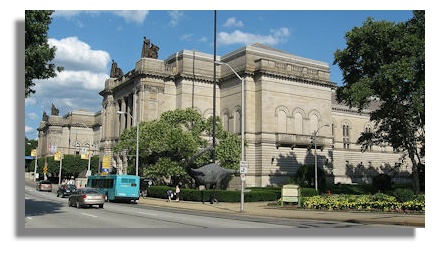 For comparability with other large cities around the world, Greater Pittsburgh has been defined as the entire urban and semi-urban area including and surrounding Allegheny County. This area appears to extend from Beaver Falls and Wallace City in the north-west to Freeport in the north-east, and from Canonsburg in the south-west to Greensburg in the south-east.
For comparability with other large cities around the world, Greater Pittsburgh has been defined as the entire urban and semi-urban area including and surrounding Allegheny County. This area appears to extend from Beaver Falls and Wallace City in the north-west to Freeport in the north-east, and from Canonsburg in the south-west to Greensburg in the south-east.
- Bairdford - there is a forest called Baird's Covert in the Scottish Borders, near Cockburn Law in the Lammermuir Hills. Baird is a Scottish surname - that's their tartan shown here. The Bairds take their name from lands held in Lanarkshire, and have produced several famous family members including John Baird of Kirkintilloch who planned and constructed New York's elevated railways on Second and Sixth Avenues and, most famous of all, John Logie Baird of Helensburgh who invented television in 1929.
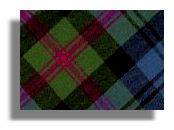
- Bell Acres and Bellvue - there are many places in Scotland with Bell as part of the name. Examples include Bell Bay in North Ayrshire, Bell Craig in the Scottish Borders and in Dumfries & Galloway, Bell Hill in Borders, Bell Rock in Fife and South Ayrshire, Bell Sike in Borders, Bell Stane in North Ayrshire, and Bell Wood in Aberdeenshire. Place names starting with this Scottish family name are also found all over England. The illustration here is a commemorative banknote in honour of Alexander Graham Bell, the Scot who was first to patent the telephone.
- Ben Avon and Ben Avon Heights - Ben Avon is Scotland's (and Britain's) 13th tallest mountain, on the border between Aberdeenshire and Moray. No explanation has been found for the origin of the names of these Pittsburgh suburbs apart from the comment that Ben Avon is a Scottish name meaning 'hill by the waters' (Ben Avon Community Profile). The suburbs appear to have been named in 1891 and 1906 respectively.
- Blaine Hill - Black (1996), the authority on Scottish family names, states that Blaine is a "reduced form of MacBlain". According to the House of Names Heraldic website, Blaine is a Scottish family name from Ayrshire. Its origin is said to be from the Gaelic bláán (yellow).
- Borland Manor - there are places called Borland in East Ayrshire, East Renfrewshire, Perth & Kinross and South Lanarkshire. There is also a Borland House in Stirling.
- Brackenridge (South Lanarkshire). Brackenridge is a Lowland Scottish family name. This community was incorporated in 1900 and was named for the industrialist Henry Morgan Brackenridge. Brackenridge's great-grandfather, Hugh Henry Brackenridge, author and jurist, "whose name is intimately associated with the early history of Pittsburgh." (Espenshade, 1995, p.273) was born in 1748 in Campbeltown, Scotland.
- Braddock, Braddock Hills and North Braddock - According to Espenshade (1995), the authority on place names in Pennsylvania, these neighbourhoods "perpetuate the name and the memory of Major-General Edward Braddock, who received his death-wound here in the dreadful battle with the French and Indians on July 9, 1755." (p.207). Major-General Edward Braddock was born in Perthshire, Scotland in 1695.
- Braeburn - this is probably an inversion of Burnbrae, a place name commonly found in Scotland. 'Brae' (pronounced bray) is a Scots word meaning a hill or hillside and 'burn' is a Scots word for a stream or creek.
- Bruceton (Perth & Kinross). Bruce is also a Scottish and northern English family name of Norman origin.
- California-Kirkbride - the Kirkbride part of the name of this Pittsburgh neighbourhood is most probably Scottish since it is strongly associated with Dumfries & Galloway (though there is also town called Kirkbride just over the border in Cumbria). The California part of the name presumably refers to the American State, probably because of the nineteenth century gold rush when the name California was synonymous with fabulous wealth.
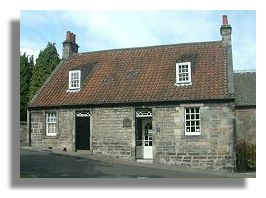
- Carnegie and East Carnegie - there is a place called Carnegie in Angus. These communities were named as a compliment to the steel magnate and philanthropist Andrew Carnegie (1835-1918) who was born in Dunfermline, Fife - see the illustration of his birthplace. Carnegie founded the largest iron and steel works in the USA and retired, a multimillionaire, to Skibo Castle in Sutherland, Highland. Among the many beneficiaries of his estate were universities and public libraries in both America and Britain and numerous institutes and trusts were set up including the Pittsburgh Carnegie Institute. Espenshade (1995) notes that Andrew Carnegie gave the borough of Carnegie an "excellent library" after its incorporation in 1894 and after the borough was named in his honour. It may interest readers to learn that the suburb of Carnegie in Melbourne, Australia, was also named in honour of Andrew Carnegie. See also the Cultural Legacy of Andrew Carnegie elsewhere on this site.
- Central Highlands - possibly recalling the Highlands of Scotland but more likely a name that is descriptive of the terrain.
- Clairton - The name of this community possibly has a Scottish connection. Espenshade (1995) states that "the origin of the name of the city of Clairton, in Allegheny County, cannot be given with certainty and fulness. One can be fairly sure that the name Clairton has been made by adding the locative suffix ton ('town') to Clair ('clear, bright or illustrious'), the second syllable of the surname St. Clair or its variant form, Sinclair. The current traditional explanation is that the name Clairton is derived from the name of Samuel Sinclair, who once owned a tract of 215 acres of land on which part of the present city is built, and not from General Arthur St. Clair…" (Espenshade, 1995, p. 209).
- Cochrans Mills - Cochran is a variant of the Scottish family name of Cochrane. The only place in the British Isles with this name is Cochrane Pike, over the border in Northumberland.
- Cowansburg - there is a Cowan Fell, Cowans and Cowans Farm in Dumfries & Galloway, Cowan's Croft and Cowans Knowe in Scottish Borders, and Cowans Law in East Ayrshire. The name has also travelled to England (Cowan Bridge in Lancashire), probably taken there by a Scottish settler. Cowan is a common surname in Ayrshire, Dumfriesshire and other Lowland counties and may have been a corruption of Colquhoun.
- Coulter and Coulters - there is a place in South Lanarkshire called Coulter. Coulter is also a Scottish family name.
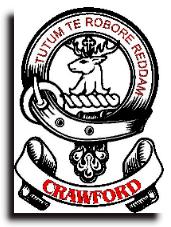
- Crawford-Roberts Hill - the Crawford part of the name of this Pittsburgh neighbourhood is decidedly Scottish. There are several places in Scotland that are based on this Lowland family name (their crest is shown here) including Crawford in South Lanarkshire, Crawfordton, Crawfordton Burn and Crawfordton Hill (all in Dumfries & Galloway), Crawford Hill (East Ayrshire), Crawforddyke and Crawfordjohn (South Lanarkshire) and Crawfordston (South Ayrshire). There are also a few places in northern England and Northern Ireland with Crawford as part of the name, probably having been taken there by Scottish settlers. Crawford (sometimes spelt Crauford) is a Scottish name that goes back to at least the 13th century. William Wallace's mother is believed to have been the daughter of Sir Hugh Crawford, Sheriff of Ayr. Roberts, on the other hand, is a common Welsh surname.
- Donaldsons Crossroads - although this family name occurs as a place name within the British Isles only in Northumberland (Donaldson's Lodge), its origin is strongly Scottish, the family name first being recorded in Galloway. Donaldson is a sept of Clan MacDonald.
- Dormont (Dumfries & Galloway). Although this name occurs only in Scotland and not elsewhere within the British Isles, its origin is not necessarily Scottish. Espenshade (1995, p. 197) provides the following account of the origin of the name of this Pittsburgh suburb. "The ornate and somewhat pretentious name, from the French d'or mont, "mount of gold," was suggested by Gilbert M. Brown, who became the first burgess of Dormont. The name refers to the beautiful hills on which the town is built and to the wonderful opportunities that they offered." One nevertheless wonders whether the true derivation of the name was the place in southern Scotland since 'mount of gold' in French is 'mont d'or' and Brown is a common Scottish family name.
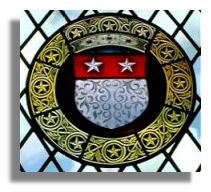
- Douglas - there is a Douglas in South Lanarkshire (the original territorial base of the powerful Douglas family) as well as in Ireland and on the Isle of Man.
- Douglass - a variant spelling of the ancient Scottish family name Douglas, first found in Lanarkshire, though experts disagree as to the origin of the name, some claiming it to be Pictish while others regard it as Flemish. The name of this community probably commemorates Frederick Douglass, the famous nineteenth-century African American who lectured within the States and abroad on the evils of slavery. The crest here is that of Douglas, Earl of Morton.
- Downieville - there are many places in Scotland that incorporate the name Downie. Examples include Downie Bay and Downie Point in Aberdeenshire, the town of Downies (also Aberdeenshire), Downie Mill and Downiebank in Angus, and Downies Burn (a water feature in Dumfries & Galloway). Downie is a Scottish family name derived from the parish of Downie in Angus where the surname is still commonly encountered. It is also one of the oldest names in the parish of Kenmay, Aberdeenshire, recorded as early as 1254.
- Duff City - places in Scotland based on this Scottish family name include Duff House and Duff's Hill in Aberdeenshire and Duff's Loch in Dumfries & Galloway.
- Elizabeth, East Elizabeth and West Elizabeth - These suburbs could well have a Scottish connection, judging by the following account of the origin of the name. "Elizabeth, in Allegheny County, was laid out in 1787 by Stephen Bayard and named in honor of his bride, Elizabeth Mackay Bayard, daughter of Colonel Æneas Mackay, once commandant at Fort Pitt." (Espenshade, 1995, p. 254). Mackay is a Scottish family name.
- Ewingville - there is a Ewingston in East Lothian based on the Scottish surname Ewing. The name also occurs in two southern English counties, including Ewings in Devon, but Ewing is a Scottish family name from Argyll, its origin being Gaelic (Eógann, from the Latin Eugenius).
- Findlay - there are several places in Scotland based on this Scottish family name. These include Findlay Farm and Findlayston in Aberdeenshire, Findlay's Rock in Argyll & Bute, Findlayston in East Ayrshire and Findlay's Seat in Moray.
- Fineview (Dumfries & Galloway). It is probable, however, that the name of this Pittsburgh neighbourhood is simply descriptive of its situation. In the City of Pittsburgh website it is stated that "Fineview has one of the best views of Downtown Pittsburgh around." (article retrieved in August 2008). It is nevertheless still possible that the name was given with the Scottish village in mind.
- Forbes Road - there are places called Forbes Villa and Forbestown in Aberdeenshire, and Forbes Place in Inverclyde, based on the Scottish surname of Forbes. It is highly probable that the name of this community recalls General John Forbes who in 1757-58 had a wagon road cut for military purposes from Fort Bedford toward Fort Duquesne (present-day Pittsburgh), the road later becoming known as 'Forbes Trail' by settlers moving into western Pennsylvania. General Forbes (1707-1759) was born in Fife, Scotland, the son of an army officer, and was responsible for capturing the French outpost at Fort Duquesne, renaming it 'Fort Pitt'.
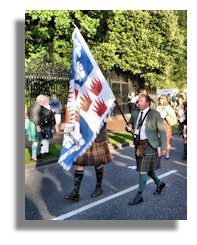
- Frazer - a variant spelling of the common Scottish family name of Fraser. In the USA, however, this surname is also born by Jewish families whose original names had become Americanised (Ancestry.com). The graphic is of Clan Fraser of Lovat at the Gathering of the clans in Edinburgh, 2009.
- Fulton (Dumfries & Galloway). In the Ancestry.com website it is stated that Fulton is probably a reduced form of Fullerton, from a place in Roxburghshire in the Scottish Borders. No information has been found on the origin of the name of this community in Westmoreland County.
- Gilkeson - there is a Gilkerscleuch Mains in South Lanarkshire. In the USA, Gilkeson is a variant of Gilkison or Gilkinson (Ancestry.com), a Scottish surname derived from Gilchriston, the Anglicised form of MacGilchrist.
- Glen Eden - there is a Gleneden in Fife Regional Park.
- Glendale (Highland). A remarkably large number of American cities have suburbs or neighbourhoods called Glendale, a name simply meaning 'valley'. The unusual feature of this name is that it is a tautology - 'valley' features twice, first in Gaelic (gleann) then in Norse (dalr).
- Glenshaw - although a place by this name does not exist in Scotland, Shaw is a Scottish clan name. Shaw does exist as a place name in northern England, however. The name, both in Lowland Scotland and in Northern England, is derived from an Old English word 'sceaga' meaning a small wood. The use of 'glen' as a prefix to the name of this Greater Pittsburgh neighbourhood increases the chances of a Scottish rather than an English connection.
- Glenwood (Aberdeenshire). This name is commonly used throughout the USA, however, and may be purely descriptive in origin.
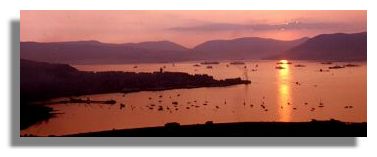
- Greenock (Inverclyde). The illustration above shows the harbour at Greenock and the Firth of Clyde at sunset during a Royal Navy review.
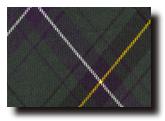
- Hendersonville - there is a Henderson's Rock in Argyll & Bute as well as a Henderson's House in Durham, England. Henderson (meaning 'Henry's son') is a Lowland Scottish family name - that's its tartan shown here. There appear to be two localities in Greater Pittsburgh called Hendersonville, one in the far north (Butler County) and another in the far south (Washington County).
- Highland - possibly recalling the Highlands of Scotland. There appear to be three localities in the Greater Pittsburgh area called Highland, two of which are in Allegheny County and the third in Westmoreland County. The Highland Park neighbourhood of the City of Pittsburgh, on the other hand, derives its name from the park around which it was built but the name of the park appears to have no Scottish connection (see Highland Park below).

- Houston (Renfrewshire) though the name of the community in Washington County is more likely to recall Houston, Texas named after General Sam Houston, whose ancestry was Scottish on both sides of the family. The Houston family crest is shown here.
- Irwin and North Irwin - although there are no place names in Scotland with this name, Irwin is a variant of Irvine, a Scottish family name. These Westmoreland County communities bear the name of John Irwin, who founded the township of Irwin in 1853 (Espenshade, 1995, p. 276).
- Jacktown - Jack is said to be a Scottish name from Renfrewshire, derived from the French Jacques. Within Britain, according to Ancestry.com, the surname Jack is almost exclusively Scottish.
- Kinlock - the name of this neighbourhood probably refers to Kinloch, a name that occurs widely throughout Scotland since it means 'head of the loch'.
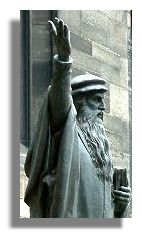
- Knoxville - there is a Knox Hill in Aberdeenshire, Knox Knowe in the Scottish Borders and Knoxfauld in Perth & Kinross but the name is also found in England, including the village of Knox on the outskirts of Harrogate in North Yorkshire. Scotland's most famous Knox was John Knox, one of the founders of the Church of Scotland over four hundred years ago (see graphic). According to Espenshade (1995), the Pittsburgh neighbourhood was named for a Methodist minister, the Reverend Jeremiah Knox, whose heirs laid out a town in 1873 and named it Knoxville in his honour. It is not known whether the Rev. Knox had Scottish ancestors but the surname Knox is associated more strongly with Scotland than with England.
- Logans Ferry Heights - there are places in Dumfries & Galloway and East Ayrshire called Logan. Logan is a Scottish surname, the family being well established by the end of the 12th century.
- Magill Heights - Magill is a variant of the Scottish family name MacGill, first recorded in Galloway. According to the House of Names Heraldic website, the name was apparently used by the Strathclyde Britons to identify people from Galloway.
- McAdams - MacAdam is a sept of Clan MacGregor. Perhaps the most famous member of this Scottish family was John McAdam, who invented the process of sealing road surfaces ('tar macadam', shortened to 'Tarmac').
- McAlisters Crossroads - MacAlister is a Scottish family name meaning 'son of Alexander'. The Alexander in question was Alasdair, great-grandfather of the first Lord of the Isles.
- McCandless - a Scottish family name first recorded in Galloway. There are many spelling variations including McCandlish, McAndliss, McChandlish and several others. The article in Wikipedia on McCandless, Pennsylvania, retrieved in July 2011, provides the following explanation of the name: "The Township was originally founded in 1851 and called Taylor. The Township was incorporated in 1857 as a Second Class Township and renamed McCandless in honor of District Judge Wilson McCandless."
- McClarran - presumably a corrupted, or intentionally phonetic, rendering of the Scottish family name of MacLaren.
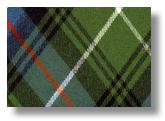
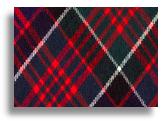
- McDonald - MacDonald is one of the best known Scottish surnames, though there are Irish McDonalds as well. There are numerous branches of the MacDonald clan such as MacDonald of Sleat, MacDonald of Clanranald, MacDonnell of Glengarry and MacDonnell of Keppoch. The tartans above are MacDonald, Lord of the Isles and MacDonald of Clanranald. This community in Washington County "took its name from old Fort McDonald, which was built during the Revolutionary War on the land of John McDonald, who settled here in 1775." (Espenshade, 1995, p. 278)
- McKnight - the MacKnights are a sept of the MacNaughtons.
- McNary - a sept of Clan MacNaughton, McNary is one of the lesser-known Scottish family names but is of ancient origin, going back to the Picts. Experts are divided as to the original meaning of this name (son of the king, son of the heir, son of the smith and son of the stranger being among them). There are many spelling variations including MacNair, MacNaire, MacNayer, MacNeir, MacNuir and McNarie. No information has been found to date on the McNary whose name was given to the community in the south of the Pittsburgh metropolitan area.
- Milligantown - there are places called Milligansbush, Milligansbushfield and Milliganton in Dumfries & Galloway. Milligan is a Scottish surname derived from the double diminutive of 'mael-oc-an' - 'the little bald or shaved one', probably alluding to the ancient Gaelic tonsure.
- Monroe Heights and Monroeville - Monroe is an alternative spelling of the Scottish surname of Munro, and is derived from the Gaelic 'Rothach' or 'a man of Ro'. According to Black (1996) their ancestors probably came from Ireland, from the foot of the river Roe in County Derry, which produced the place name 'Bunrotha' from which 'Munrotha' was derived. Mountain peaks in Scotland over 3,000 feet are called "Munros" because Sir Hugh Munro in 1891 produced a definitive list of these. In the article on Monroeville, Pennsylvania, retrieved from Wikipedia in December 2009, it is stated that these communities were named for Joel Monroe, the area's first postmaster.
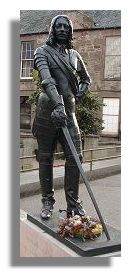
- Montrose Hill (Montrose in Angus). One of the reasons for the popularity of the name Montrose throughout the English-speaking world may have to do with Sir Walter Scott's novel 'The Legend of Montrose', published in 1819. Or it may be a reference to the brilliant soldier James Graham, the first Marquis of Montrose, who achieved a series of victories in his campaign in Scotland on behalf of King Charles I. That's his statue (in the Angus town of Montrose) shown here.
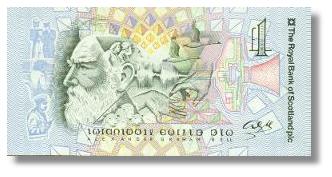
- Morningside (Dumfries & Galloway, City of Edinburgh, North Lanarkshire and Perth & Kinross). The illustration shows a typical mansion in Morningside, Edinburgh.
- Murdocksville - probably based on the Scottish surname Murdoch, rendered phonetically.
- Orrville - there are water features called Orr Shun in the Orkney Islands and Orr Wick in the Shetland Islands, plus several other places in Scotland beginning with Orr such as Orrock (Fife) and Orroland (Dumfries & Galloway). Orr is a common Scots surname and the name of an old Renfrewshire family. According to Black (1996) the name comes from the Gaelic 'odhar' which means 'of sallow complexion'. No information has been found on the reason for the name Orrville, which is an alternative name for Springdale Township.
- Patterson Heights and Patterson Hill - Patterson is a variant spelling of the Scottish family name of Paterson ('Patrick's son'). The Paterson clan was originally located on the north side of Loch Fyne in Argyll. According to Black (1996), Patterson is one of the most common family names in Scotland.
- Pitcairn (Fife and Perth & Kinross). Pitcairn is a Scottish family name. This township was named for Robert Pitcairn, superintendent of the Pittsburgh division of the Pennsylvania Railroad Company during the 1880s (Espenshade, 1995, p. 227).
- Rankin - there is a Rankinston in East Ayrshire, and Rankin's Rocks in Argyll & Bute, both based on the Scottish surname of Rankin. The early, pre-17th century home of the Rankins was Ayrshire. The Rankins are a sept of Clan MacLean. The Pittsburgh suburb takes its name from the railway station which, in turn, was named for a Thomas Rankin, a local farmer during the 1870s (Espenshade, 1995, p. 229).
- Renton and Renton Junction - there is a place in Dunbartonshire, Scotland called Renton. Renton is also a Scottish family name.
- Ross - there are many places in Scotland called Ross (in the Scottish Borders, Dumfries & Galloway, Highland and Perth & Kinross) and many more places throughout Scotland that have Ross as part of the name. The same is true for England and Ireland, though less commonly so than for Scotland. Ross is of course a fairly common Scottish family name originating nearly 900 years ago from two very different sources: Yorkshire in northern England (the Ayrshire Ross's) and that part of the Highlands of Scotland once known as Ross-shire. The Pittsburgh suburb of Ross was named in honour of James Ross, an eminent Pittsburgh attorney (Edward G Williams, The History of Ross Township, Ross Township website, www.ross.pa.us). James Ross and many other pioneering Pittsburgh lawyers came from Northern Ireland and can therefore be considered as "Scotch-Irish" (Ulster Scots).
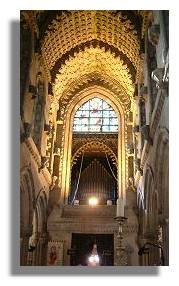
- Rosslyn Farms (Midlothian). Rosslyn was the village made famous in Sir Walter Scott's 'Lay of the Last Minstrel'. The name may also recall Rosslyn Chapel (also in Midlothian - see illustration) founded in 1446 by Henry St Clair (Sinclair), Earl of Roslin. This is a distinct possibility in the case of Pittsburgh, given that St Clair is the name of three separate communities in the area. No information has been found on the history of Rosslyn Farms apart from the statement in the community's website that it was founded in 1902 by the Chartiers Land Company, and was developed by William Parrish.
- Scab Hill - there is a Scabcleuch in the Scottish Borders, Scab Craigs in Dumfries & Galloway, and Scabgill in South Lanarkshire, but no Scab Hill as such. The place name element 'scab' appears to occur only in Scotland and not elsewhere in the British Isles.
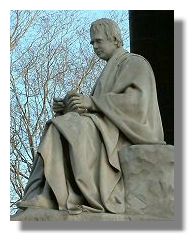
- Scott, Scott Haven and Scottsville - there are numerous places both in Scotland and England with Scott as an element in the name. Scotland's most famous Scott is of course the nineteenth century novelist and poet Sir Walter Scott. The picture here is of his statue beneath the Scott Monument in Edinburgh.
- St Clair and Upper St Clair - this name, which is of Norman origin, is mainly associated with Scotland since it gave rise to the Scottish surname of Sinclair. There appear to be three separate communities in metropolitan Pittsburgh called St Clair, one in the City of Pittsburgh itself, and the other two in Beaver and Westmoreland Counties. Espenshade (1995, p. 209) attributes the names of these communities to General Arthur St. Clair, "who was a prominent figure in the early history of western Pennsylvania…." Arthur St Clair (1737-1818), was born at Thurso, Caithness, Scotland. He settled in America in 1764 and joined the revolutionary forces, attaining the rank of Major General. In 1788, he served as the 15th President of the Continental Congress, following which he was appointed Governor of the Northwest Territory - what is today Ohio, Indiana, Illinois and Michigan (article on Arthur St Clair retrieved from Wikipedia in July 2011).
- Stewart and Stewartsville - there is a Stewarton in Argyll & Bute, Scottish Borders, East Ayrshire and Dumfries & Galloway plus numerous other place names throughout Scotland and parts of England and Northern Ireland that are based on the Scottish surname of Stewart. The Stewarts are descended from a Breton, Alan Fitzflaald, the crown of Scotland being brought to his descendants by Walter (1293-1326), fifth Steward of Scotland, whose son became King Robert II. The last of the Royal Stewarts/Stuarts was Queen Anne (1665-1714).
- Stobo (Scottish Borders).
- Sutersville - Suter is a Scottish family name from Angus. Its origin is occupational, from Old English and Old Norse words for a cobbler or shoemaker (as in Souter Johnnie in Robert Burns' Tam o' Shanter).
- Walkers Mill - there are several places in Scotland based on the Scottish surname of Walker. The list includes Walkerburn (Scottish Borders), Walkerdales (Moray), Walkerdyke (South Lanarkshire), Walkerhill (Aberdeenshire and Dumfries & Galloway), Walkersknowe (Scottish Borders), Walkerstrough (Moray) and Walkerton (Fife). Johnnie Walker Red Label Scotch Whisky is probably the best known reference the world over to Walker as a Scottish surname. But Walker is even more commonly found in England, including the town of Walker itself in the Tyneside area of northern England. Moreover, Walker is said to be the 15th most common family name in England. The Pittsburgh suburb of Walkers Mill can nevertheless be classed as a Scottish name. The Wikipedia article on Rennerdale, Pennsylvania, retrieved in December 2009 provides the following explanation: "Gabriel Walker and Isaac Walker, Scots-Irish brothers from Lancaster county, Pennsylvania arrived in 1772. Walker's Mill, the village east of Rennerdale, is named for Isaac Walker."
- Wallace City - there are many places in Scotland based on the Scottish surname of Wallace, examples being Wallaceton in Dumfries & Galloway, Wallacetown in South Ayrshire and Wallacestone in Falkirk. One of Scotland's most famous Wallaces is Sir William Wallace, the thirteenth century patriot who championed Scotland's independence when this was under threat by King Edward I of England's expansionist policy. Wallace means 'Welshman', a Saxon term for 'foreigner' that was applied by the Saxons to the descendants of the Celtic-speaking Ancient Britons in Wales, Cornwall, Cumbria and Strathclyde.
- Wylie - there are places called Wyliehole, Wylies Burn, Wylies Craigs and Wylies Hill in the Scottish Borders. Wylie is a form of Willie, a surname found in Scotland from 1454.
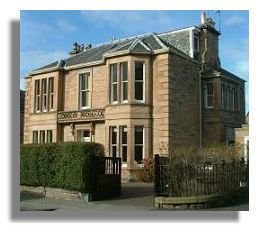
Some of the following districts, neighbourhoods, subdivisions and suburbs are also likely to have a direct or indirect Scottish connection but these names are used in other parts of the British Isles as well. A large number of these names are based on family names which could be Scottish, English or Irish in origin, which suggests that several may in fact be what Americans term 'Scotch-Irish' names (i.e., names brought to Pennsylvania by immigrants from (Northern) Ireland, whose ancestors were ultimately Scottish, or in a few instances English. The author of this article would appreciate any assistance that local historians and genealogists can provide in determining which of these names can be classified as definitely "Scottish" or "Scotch-Irish".
- Allison Park - As a place name, Allison occurs only in England. As a family name, however, its origin is both English and Scottish (www.answers.com). According to Black (1996), the name is probably from "son of Ellis", though other sources suggest that it may have been derived from Alister or Alexander (Black prefers the first explanation). The earliest record of the name in Scotland is Patrick Alissone from Berwick who signed the Ragman Rolls in 1296. The Scottish Allisons now have their own family tartan.
- Blackburn (Aberdeenshire, Scottish Borders, Dumfries & Galloway, Highland, Moray, South Lanarkshire and West Lothian) but found just as frequently in northern England.
- Bocktown - Bock is said to be a Scottish family name from Berwickshire. Its origin is apparently Viking, from a place called Boak in the parish of Kirkholm. However, Bock is also a German family name.
- Bower Hill (South Ayrshire) also in Somerset, England. According to Black (1996) Bower is a Scottish family name "from the manor of Bower in the parish of Drummelzier, Peebleshire". The family name goes back at least to the thirteenth century as the Bowers were among the many Scottish lairds listed in the Ragman Rolls as having sworn loyalty to King Edward I of England. As a surname, Bower could be either Scottish or English (Ancestry.com). Moreover, in the USA, it could be an Americanisation of the German surname Bauer.
- Boyce - this does not occur as a place name in Scotland but Black (1996) lists Boyce as a Scottish family name. However, it occurs as an element in at least four southern English places. The House of Names Heraldic website categorises Boyce as a Scottish name but notes that it probably originated in Buckinghamshire, England. The Ancestry.com website considers the name to be Scottish, English or Irish.
- Browntown - this name does not occur anywhere in the British Isles. Brown on its occurs widely as an element in Scottish place names (there are at least 25 places in Scotland called Brown Hill alone) but is used even more commonly in England. Brown is also a common Scottish family name (septs of Lamont and Macmillan) though the name seems to have originated on the English side of the border, in Cumbria, and is reckoned to be the third most common surname in England.
- Clinton - Black (1996) lists this name as probably being a shortened form of MacClinton, which is a Scottish family name, though rarely encountered in Scotland today. However, Clinton is also an English family name. The name of this community in Allegheny County would be English rather than Scottish if it honours Vice President George Clinton (1739-1812), who was the first Governor of New York and whose father was English.
- Cool Valley - According to the House of Names Heraldic website, Cool is a variant of the Aberdeenshire family name of Coul or Cowell. The Ancestry.com website, on the other hand, classifies the name as both Scottish and Irish - a reduced form of McCool. However, Black (1996), the authority on Scottish family names, does not mention the name. It is possible, of course, that the name of this community in Washington County may be a literal reference to a valley with a cool temperature.
- Curry - this could be a spelling variation of the Scottish family name Currie. On the other hand, Curry is found in several place names in England (e.g., Curry Mallet and Curry Rivel in Somerset) and Ireland (e.g., Curry and Tobercurry in County Sligo). According to Ancestry.com, Curry is essentially an Irish family name, though in Scotland and England it is likely to be a variant of Currie.
- Davidson Heights - there is a Davidson's Mains in the City of Edinburgh, also Davidson's Burn and Davidson's Linn over the border in Northumberland. As a family name, Davidson is either Scottish or northern English. In the USA moreover, the name could be an Americanisation of Scandinavian or German-Jewish surnames (Ancestry.com).
- Dick -a Scottish and English family name, a short form of Richard. "Although found in every part of Britain, the form Dick is especially common in Scotland, and it was from there, in the 17th century, that the surname was taken to northern Ireland." (Ancestry.com). In the USA, the name could equally be of German, Yiddish, Dutch or Flemish origin, from the word 'dik', meaning 'thick'.
- Dixmont - According to the House of names Heraldic website, Dix is said to be a variant of the Scottish family name Dixon or Dickson, meaning, quite literally, the 'son of Dick' (Richard). Black (1996) makes no mention of Dix as a Scottish family name, however, while the Ancestry.com website classes the name as English. Although there is a place called Dixton in East Ayrshire, there are also places called Dixton in Gloucestershire, England and Monmouthshire, Wales and there is a Dix's Farm in Norfolk, England.
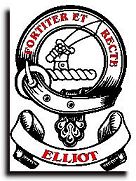
- Elliott - there is a place in Scotland (in Angus) called Elliot. Elliot is a Scottish family name derived ultimately from the Old English Ælfwald, a common Saxon name on the Scottish Borders which was the original home of the Elliots. The family crest is shown here. The Elliots later settled in Forfar (whence the modern place name in Angus) before heading south again, this time to Liddesdale where, by the late 16th century, "they had the doubtful honour of heading, with the Armstrongs, the list of the most unruly of the Border clans." (Scarlett, 1975, p. 60). It is not certain, however, whether this Pittsburgh neighbourhood necessarily has a link with Scotland. Its spelling, Elliott, suggests that it is more likely to be an English name.
- Emblem - there is an Emblem Brae in Dumfries & Galloway. It is highly unlikely, however, that the small Scottish village gave its name to this community.
- Gibsonia - Gibson is a Scottish and English family name meaning 'son of Gibb'. The suburb of Gibsonia was named "in honor of the Gibson family who settled the area and their original house is still standing." (Wikipedia article on Gibsonia, Pennsylvania, retrieved in December 2009)
- Gill Hall - there are places called Gill in Dumfries & Galloway, North Ayrshire, Orkney Islands and South Lanarkshire, as well as in Cumbria and North Yorkshire in northern England. Gill is also a Scottish surname. According to Black (1996) the Aberdeen family of this name is thought to have come from Cumberland (now Cumbria) possibly in the 13th century. Gill is also an Old Norse word meaning 'ravine'.
- Glassmere - this semi-Scottish sounding place name does not occur in Scotland. Glass is a Scottish family name, however, originally from Bute. Black (1996) states that the name in Scotland could be a shortened form of Mac Gille Glais - "son of the grey lad". 'Glas' is the Gaelic word for grey. Glass is also a fairly common Jewish family name.
- Glenfield (Orkney Islands) also Leicestershire, England.
- Gregg - there are no places in Scotland with this name, whereas two can be found in England. In Scotland, Gregg is one of the many spelling variations of the Scottish family name of Greig. Black (1996) states that Greig is a common name, especially in Fife and along the east central coast. Records for the name go back to the 13th century. Gregg is also an English family name, however (Ancestry.com).
- Guffey - According to the House of Names Heraldic website, Guffey is a Scottish family name, one of the many variants of McFie. However, the name is not mentioned in Black (1996), the closest being MacGuffie. In the Ancestry.com website, it is stated that Guffey is a reduced form of McGuffey, a name that could be either Scottish or Irish.
- Hackett - the only place in the British Isles called Hackett is in Pembrokeshire, Wales. As a family name, Hackett could be Scottish (a variant of Halkett), English or Irish, according to Ancestry.com.
- Hardy - the Scottish Hardie/Hardy family are septs of Clans Farquharson and Mackintosh. According to Ancestry.com, however, the name is equally likely to be English or Irish.
- Hays Mill and Haysville - there are several places in Scotland based on the Scottish surname of Hay. The list includes Hayshead in Angus, Hayside in Scottish Borders, Haysmuir in East Ayrshire, Haystack in Fife, Hayside in Scottish Borders, Haysike in Scottish Borders, Hayston in Fife and East Dunbartonshire, Hayston Hill in Angus and Haystoun in Scottish Borders. However, there are also many references to Hay in England, Ireland and Wales, including a small town in County Meath, Ireland that is simply called Hays. Hay is an ancient Scottish surname of Norman origin, the family being associated with Scotland from about 1160.
- Homeville, Homewood, Homewood North, Homewood South and Homewood West - these names do not occur anywhere within the British Isles. Home/Hume is an important Border family, with various spellings. David Hume was a well-known C18th philosopher. The popularity of Homewood as a place name in American cities suggests, however, that it is unlikely to refer to the family name Home/Hume.
- Kennedy - an ancient Scottish family name though there are many Irish Kennedy's as well (Kennedy being the 16th most common family name in Ireland), the name possibly having been taken there by Scottish settlers. The meaning of the name in Gaelic is 'ugly head'. The picture shows Bishop James Kennedy who founded St Salvator's College and Chapel at St Andrew's University in the 15th century.
- Markle - there are places called Markle and Markle Mains in East Lothian. It is more likely, however, that the name of this community in Westmoreland County is associated with the Markle family, whose name is an Americanisation of the Prussian surname Mercklen.
- Marshall and Marshall-Shadeland - there is a Marshall Moor in Renfrewshire, though Marshall occurs far more commonly in English place names. Marshall is both a Scottish and an English surname, the Scottish Marshalls being a sept of Clan Keith.
- McMurray - the MacMurrays are a sept of one of Scotland's best-known clans - Murray. On the other hand, McMurray is considered to be a Northern Irish name from the (Irish) Gaelic 'Muireadhach' meaning 'seafarer' (Ancestry.com).
- Millersdale and Millerstown - there is a Millerhill in Midlothian and Millerston in Glasgow plus numerous other places in Scotland with Miller as an element in the name, but this is also the case in England, Miller being a common English family name.
- Morgan and Morgan Hill - Morgan is a Scottish family name, associated with Clan MacKay. However, it is also a very common Welsh family name (Morganstown is a suburb of Cardiff in the former Welsh county of Glamorgan) and the name has been taken to England as well, probably by the Welsh Morgans, e.g., Morgan's Hill in Wiltshire.
- Peter Manns Corner - According to the House of Names Heraldic website, Mann is a Scottish family name from Aberdeenshire, the family being a sept of Clan Gunn. Black (1996), the authority on Scottish family names, lists Mann as a variant of Main, which is a shortened form of the surname Magnus. However, Mann is also a German surname. Considering the large number of German settlers in the Pittsburgh area, the origin of the name of this community could be either Scottish or German. Espenshade (1995, p. 305) mentions a prominent family of industrialists called Mann, who were famous for manufacturing axes and whose ancestor, Thomas Mann, came from Ireland in 1750. It is possible that Peter Mann, after whom the neighbourhood was presumably named, may have been connected with this family, whose roots are most probably Scots-Irish.
- Poke Run - Poke is said to be a Scottish family name from Renfrewshire, one of the many variants of Pollock. This may be true, but Poke is not mentioned in Black (1996), the authority on Scottish family names.
- Sharpsburg - there are places in Scotland called Sharp Craig (Dumfries & Galloway), Sharphill (North Ayrshire) and Sharplaw (Scottish Borders). Sharp is also said to be a Scottish family name from Peebles in the Scottish Borders. Sharp, however, occurs as an element in a large number of place names throughout England and is considered to be an English family name as well as a Scottish one. The name of this suburb of Pittsburgh honours James Sharp (ancestry not reported), the original owner of the land in the 1820s (Espenshade, 1995, p. 233).
- Shields - several places in Scotland are called Shields (in Aberdeenshire, Renfrewshire, South Ayrshire and South Lanarkshire). However, the fact that there is also a place called South Shields in Tyneside, northern England, indicates that the name is not exclusively Scottish.
- Taylor - Taylor is a very common surname in both Scotland and England. A survey of surnames undertaken in the 1970s suggests, however, that it is the 5th most common surname in England compared with the 14th in Scotland.
- West Mayfield - there are many places in Scotland called Mayfield, in Aberdeenshire, Dumfries & Galloway, East Ayrshire, City of Edinburgh, Fife, Highland, Midlothian, North Ayrshire, Orkney Islands, Perth & Kinross, Shetland Islands and South Lanarkshire. Mayfield is also found throughout England but less commonly than in Scotland.
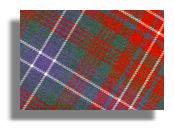
- Wilson - there are several places in Scotland based on the surname of Wilson. The list includes Wilsonhall (Angus), Wilson Burn and Wilson's Pike (Scottish Borders), Wilson's Noup (Shetland Islands) and Wilsontown (South Lanarkshire). Wilson is even more commonly found in England, including the town of Wilson itself in Herefordshire and Leicestershire. Moreover, Wilson is the eighth most common family name south of the border, according to Wikipedia. The Scottish Wilsons are a sept of Clan Gunn and now have their own family tartan, seen here.
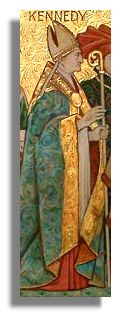
A third category of local names comprises places that definitely exist in Scotland, but there is nothing obviously "Scottish" about most of these names. The likelihood that the Greater Pittsburgh counterpart was named for Scotland is greatly reduced because these names are found far more commonly in other parts of the British Isles, either as place names or as family names. Most of the names of these localities have an 'international' flavour and several may simply have been borrowed from other American cities and towns.
- Bellevue (Dumfries & Galloway, Highland, Orkney Islands and Perth & Kinross) also in England, Ireland and Wales, sometimes spelt Belle Vue. The name could equally be of French origin.
- Blythedale - there is a Blythe, Blythe Edge, Blythe Rig and Blythe Water in the Scottish Borders and a Blythe's Tower in Fife. There is also a river Blythe in Warwickshire, and several other English places with Blythe as an element in the name. As a family name, however, Blythe is considered to be English (Ancestry.com).
- Boon Terrace - there is a Boon in the Scottish Borders as well as other references to this name in Scotland (Boon Hill, Boondreigh Burn, Boondreigh Water and Boonraw Burn in the Scottish Borders, Boonies Cottage in Dumfries & Galloway and Boonslie in East Lothian). Boon also occurs as an element in English place names. As a family name, its origin appears to be Norman, first recorded in Sussex, southern England. It is also a German and Dutch family name.
- Broughton (Scottish Borders, City of Edinburgh and Orkney Islands) though used far more commonly throughout England and is also found in Flintshire, Wales.
- Churchill (a district of the City of Edinburgh) and Churchill Valley by association. Churchill is frequently found in England and also occurs in Wales.
- Clifton (Scottish Borders, Orkney Islands and Stirling) but far more common throughout England.
- Collier - there is a Collierhall in South Lanarkshire, but Collier occurs very often in place names throughout England, both in the coalmining areas and in the countryside. Black (1996) states that the surname Collier is definitely found in Scotland and that it has an occupational origin ('charcoal burner'). It is not a common name, however.
- Evergreen (Moray) though Evergreen is also found as an element in several English place names.
- Greenfield (City of Glasgow) also in England and Wales.
- Hills (Moray and South Lanarkshire) also Swansea, Wales.
- Lemington (Scottish Borders) also in England, including a district of Newcastle-upon-Tyne. The Pittsburgh neighbourhood (better known as Lincoln-Lemington-Belmar) appears to have taken its name from Lemington Avenue.
- Manor (Stirling) but, as one would expect, this typically English-sounding name is found far more commonly throughout England.
- Midland (East Ayrshire and Orkney Islands) also Pembrokeshire, Wales.
- Norwood (Dumfries & Galloway) but this name is also very commonly used throughout England.
- Newfield (Aberdeenshire, Dumfries & Galloway, East Ayrshire, Highland, Moray, Orkney Islands, South Ayrshire and South Lanarkshire) though found almost as frequently in northern and central England.
- Newtown (Aberdeenshire, Argyll & Bute, Highland, Falkirk and Shetland Islands) even more commonly found in England and, to a lesser extent, in Ireland and Wales and on the Isle of Man.
- Oakwood (Scottish Borders, Moray and Perth & Kinross) but more common in England.
- Ogle - there are water features called Ogle Burn in East Lothian and Ogle Linn in Dumfries & Galloway but places with Ogle as part of the name are typically found in Northumberland and other parts of northern England, including a town in Northumberland called Ogle.
- Russellton - there is a Russell Mains in Fife but Russell is far more commonly encountered in place names throughout England and there is also a Russell Hill in Monmouthshire, Wales. Russell is nevertheless a fairly common Scottish surname, derived from 'rous' meaning red. The earliest reference in Scotland to this name is 1164. The Scottish Russells have their own family tartan.
- Spring Garden (South Ayrshire) also in East Sussex, spelt Spring-garden.
- Summer Hill (East Lothian; also Aberdeen City, Angus, Argyll & Bute, Dumfries & Galloway, and North Lanarkshire, spelt Summerhill). Summer Hill/Summerhill is also a popular name in England and is found in Ireland, Wales and the Isle of Man as well.
- Trees Mills - there are places called Trees in Aberdeenshire and South Ayrshire, as well as two places in northern England.
- Walter Chapel - there is a Walterstead in the Scottish Borders and Waltersmuir Reservoir in Stirling, but places with Walter as an element in the name are far more numerous in southern England and to a lesser extent in south Wales.
- West Park (Aberdeenshire; also West Park Farm in East Ayrshire, West Parkfergus in Argyll & Bute, Westpark in South Ayrshire and Westpark in South Lanarkshire) though West Park/Westpark occurs even more commonly in England.
A final category of neighbourhood and suburban names comprises places that can be found in Scotland, or Scottish-sounding family names but which, in Pittsburgh's case, definitely or most probably have no Scottish connection.
- Bloomfield - there are many places in Scotland with this name (in the Scottish Borders, Dumfries & Galloway, Fife, Moray, Orkney Islands and Perth & Kinross); the name is also used in England and Ireland, but less commonly than in Scotland. According to the City of Pittsburgh website, "Bloomfield's name was derived from the many wildflowers that bloomed there years ago." (article retrieved in August 2008).
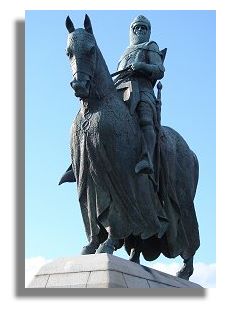
- Carrick (Argyll & Bute, Dumfries & Galloway, Fife and South Ayrshire) also in Ireland and on the Isle of Man. The illustration shows King Robert the Bruce who was Earl of Carrick before he seized the Scottish throne. Places with Carrick as part of the name are found throughout the British Isles, especially in the Celtic regions. The name simply means 'rock' (Cornish carrek, Gaelic creag, Irish carraig, Welsh craig). According to Espenshade (1995), the origin of the name of this suburb is actually Irish, from Carrick-on-Suir in County Tipperary and therefore has no connection with Scotland. The City of Pittsburgh website provides the following additional information: "In 1853, Dr. John H. O'Brien received permission from the U. S. Postal Service to establish a post office in the area; for his hard work he was given the honor of naming the area, and he chose "Carrick" after his home town, Carrick-on-Suir, Ireland."
- East Hills (Angus) also in Swansea, Wales. The neighbourhood is situated in the easternmost part of the city (City of Pittsburgh, August 2008), which would suggest that the name is purely descriptive.
- Fawn - although Fawn is said to be a family name from the Scottish Border region (House of Names website), there is no connection with Scotland. According to the official Fawn Township website, this community in north-east Allegheny County was actually named because its founders considered it to be an "offspring of its parent municipality" - Deer Township.
- Garfield - although the only place in the British Isles with this name happens to be in Scotland (in East Ayrshire), there is no connection with Scotland. The name of this Pittsburgh neighbourhood commemorates President James Abram Garfield, the 20th US President. According to an article in Wikipedia retrieved in May 2006, the first owner of a lot in this Pittsburgh neighbourhood bought his plot on the day that President Garfield was buried. Garfield is an English family name (Ancestry.com).
- Glassport - as an American surname, Glass could be Scottish, Irish, English, German or Jewish (Ancestry.com). The name of this community does not refer to an individual, however. According to Espenshade (1995, p. 198), the community "owes its name to its present importance to the plant established here in 1888 by the United States Glass Company."
- Hays - there are numerous places in Scotland based on the Scottish surname of Hay (see Hays Mill and Haysville above). The Pittsburgh neighbourhood was not named for someone with the surname Hay, however. In the City of Pittsburgh website it is stated that the name was bestowed in honour of former Pittsburgh Mayor, William B. Hayes, who served as mayor from 1903-1906. (City of Pittsburgh, August 2008). Hayes is an English or Anglo-Irish family name (Ancestry.com).
- Hazelwood (Moray) but found more commonly throughout England. There is no connection with Scotland however, since the origin of the name is purely botanical, according to the City of Pittsburgh website: "The communities of Glen Hazel and Hazelwood, which lie along the Monongahela River, once flourished with an abundance of hazelnut trees." (City of Pittsburgh, August 2008).
- Highland Park - it is tempting to assume that the name of this Pittsburgh neighbourhood was inspired by the Scottish Highlands. The neighbourhood's terrain is not particularly 'hilly' however. In a communication received in October 2006 from 'mhs', it is stated that the name of the park (from which the neighbourhood subsequently took its name) "comes not from the Scottish highlands but rather from the surveyor, Robert Hiland, who subdivided a parcel of land owned by Alexander Negley and named the street running down the center of the tract after himself…..it was only later in the nineteenth century that the name 'Hiland' was changed to 'Highland'.....perhaps Robert was a Scot.....more likely he was Bavarian and allowed his name 'Hochland' to be anglicized in order to escape his Hessian ancestry."
- Leet, Leetsdale and Leetsdale Industrial Park - there is a Leetside in the Scottish Borders, near Whitsome. The Ancestry.com website provides the following explanation of the origin of the family name Leet: "topographic name for someone who lived by a watercourse or road junction, Old English gel?t, or a habitational name from Leat in Devon, or The Leete in Essex, named with this element." One therefore wonders whether the names of these suburbs are simply a reference to the Old English term 'leet'.
- Moon, Moon Crest, Moon Run and Moon Township - there is a village in the Shetland Islands called Moon. Moon is also a Scottish surname, found in Dumfries-shire, though it is said to have originated in Devon in southern England and that it ultimately came from a place called Mohun in Normandy, France. It is very likely, however, that these considerations have no bearing on the reason for the names of these communities to the north of Pittsburgh. In an article on Moon Township, Pennsylvania, retrieved from Wikipedia in February 2007, it is stated that the township is believed to be named after a crescent-shaped bend in the river.
- Mount Oliver - according to Ancestry.com, the family name Oliver could be Scottish, English, Welsh or German. In Scotland and England the name is fairly common on both sides of the border. The following explanation given by Espenshade (1995, p. 225) suggests that a Scottish origin of the name is unlikely: "The name Mount Oliver, given to the post-office in 1872, was apparently not bestowed in honor of the Oliver family, now so prominently known in the Pittsburgh area. The traditional explanation, which is at least a very reasonable conjecture, is that Mount Oliver derived its name from Oliver Ormsby, who in 1840 owned several hundred acres of land situated in what is now the very heart of Mount Oliver."
- Mount Vernon (City of Glasgow) also in Lancashire, England. There is probably no connection with Scotland since the popularity of this place name in the USA seems to be attributable to the name of President George Washington's estate in Virginia.
- Murry Hill and Murrysville - there is a Murrystone Hill in Aberdeenshire. Murry may be a variant spelling of Murray, a well-known Scottish surname. "In 1781, Jeremiah Murry came from Ireland to Pennsylvania, then onto Franklin Township. He acquired land near the Turtle Creek and built a cabin and grist mill, and he kept store near the current location of the Presbyterian Church. Soon after the Northern Turnpike was constructed through this area in 1819, Murry established the town of Murrysville in 1820." (www.murrysville.com/about_history.html)
- South Park (Dumfries & Galloway; also Aberdeenshire, spelt Southpark) but more common in England. As the township is located to the south of Pittsburgh, its name is probably simply descriptive of this fact, with no intended reference to any particular place in Scotland or England.
- Stoops Ferry - there is a place called Stoop in Dumfries & Galloway and a Stoopshill in North Ayrshire but Stoop is also found as an element in place names in northern England. According to a message posted to the GenForum website by Ernest S. Stoops on 21 February, 2002, Stoops Ferry in Moon Township was named after Captain William Stoops (1813-1878), who ran a ferry service on the Ohio and the Monongahela Rivers. Stoops is a family name which, in the USA is considered to be of Dutch origin (Ancestry.com).
- West End (City of Edinburgh and South Lanarkshire) but evenly more commonly found in England and to a lesser extent in Wales. The neighbourhood is located to the west of the CBD, suggesting a purely descriptive reason for the name.
- Westwood (Dumfries & Galloway, Highland, Perth & Kinross, Stirling and South Lanarkshire) but Westwood is also commonly found throughout England and is a favourite name for suburban neighbourhoods in other North American cities. As this neighbourhood is located to the west of the CBD, the reason for the name is probably purely descriptive of this fact.
Pittsburgh, of course, was the centre of the mighty US iron and steel industry and was one of the first American cities to undergo rapid industrialisation during the nineteenth century. It is probable that the large number of places with Scottish names came into existence at a time when wealth, power and influence throughout the world was largely in the hands of the Protestant Establishment, which would have included many people who were Scottish or who were of Scots or Scots-Irish (i.e., Ulster Scots) descent. Judging by its place names, many of the 'founding fathers' of Pennsylvania's second largest city certainly seem to have had a direct or indirect connection with Scotland. It is therefore quite possible that the once strong Scottish presence influenced the spelling of Pittsburgh, which was first named Fort Pitt and then 'Pittsborough' by General John Forbes for William Pitt, 1st Earl of Chatham ('Pitt the Elder'), whose ancestry was Cornish.
Acknowledgements:
- Espenshade, A. Howry (1995). Pennsylvania Place Names. (Genealogical Publishing Company, Baltimore).
- Scarlett, James D. (1975). The Tartans of the Scottish Clans. (Collins, Glasgow and London).
- Black, George F. (1996). The Surnames of Scotland. (Birlinn Ltd, Edinburgh).
- Ancestry.com website
- The House of Names Heraldic Website.
- Pittsburgh City Map (Gousha, not dated).
- City of Pittsburgh official website.
- Wikipedia article on Pittsburgh.
- Mapquest.com and Maps.yahoo.com for the names and locations of outlying suburbs.
- Websites, place name gazetteers and published Ordnance Survey maps of British and Irish cities, towns, villages and counties.
© Ian Kendall
Melbourne, Australia, December 2004
Revised, September 2011
If you wish to contact Ian about his research, his e-mail address is ian.kendall1@bigpond.com.



